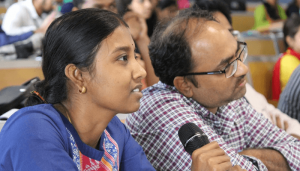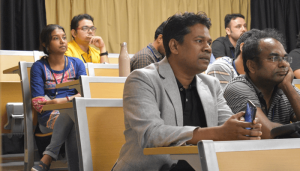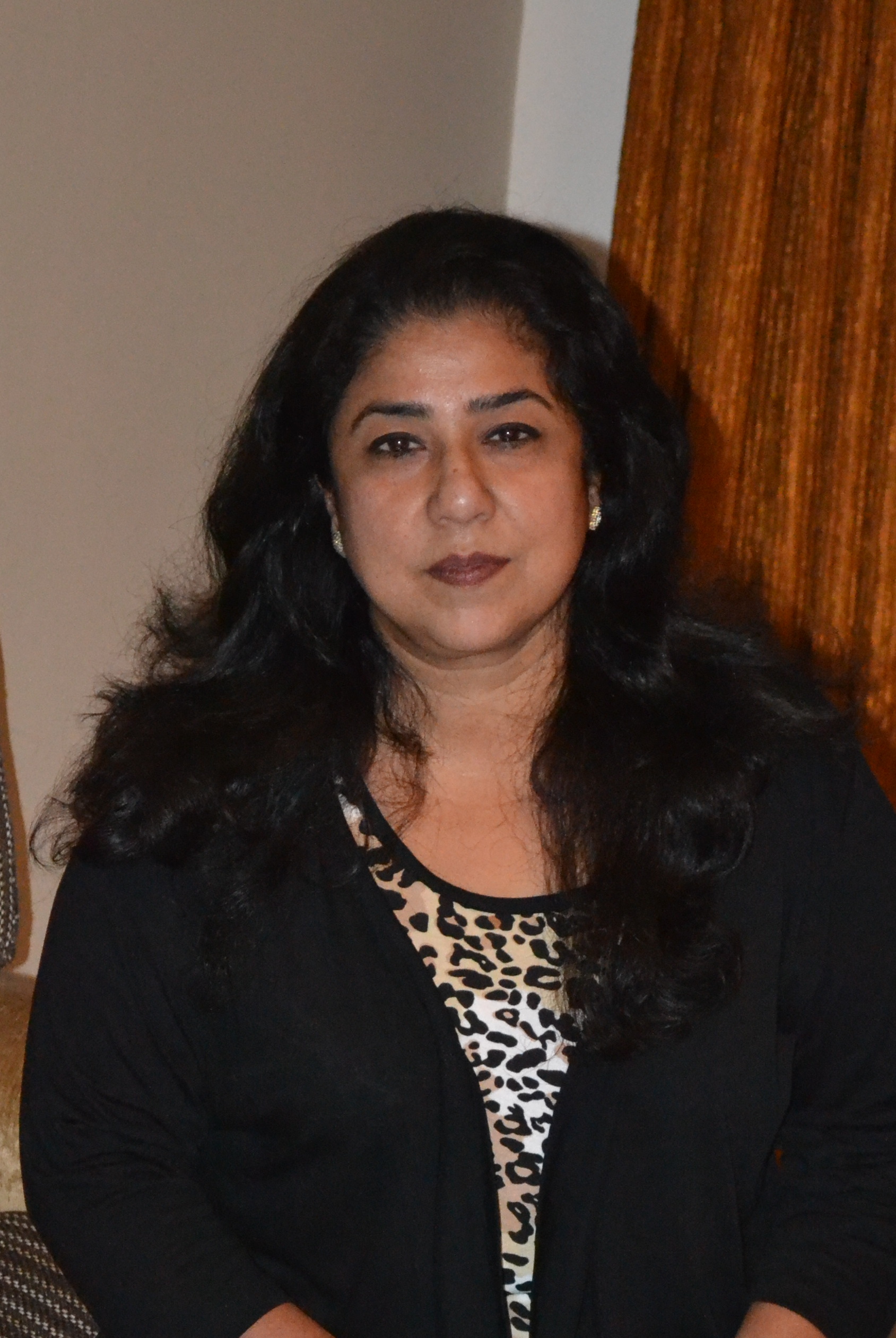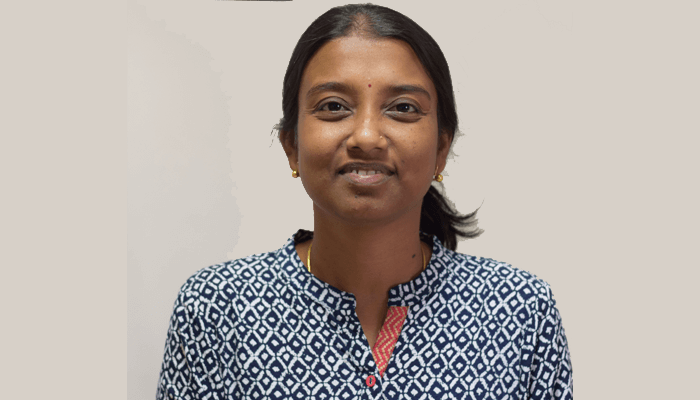Researchers from IIITH’s Center for Computational Natural Sciences and Bioinformatics (CCNSB) are working in diverse areas in basic and applied research in natural sciences. We spoke to Shampa Raghunathan, research scientist at CCNSB at IIITH about her research and the work culture on campus.
IIITH is encouraging a high level of contribution by post-doctoral fellows by getting them involved into research groups, offering attractive fellowships and encouraging the scholars to take part in other Institute activities such as teaching. Postdoctoral fellowship in general is considered as a crucial path in the process of transitioning to an independent researcher in academia or in industry.
“There is a confluence of specialties coming together at CCNSB”, says research scholar Shampa, “with scientists from different domains working side by side – from natural sciences, chemistry, physics, bio-informatics, biologists and biotechnology along with the experimental labs and computational labs.” In the last couple of years, IIITH has been looking at Artificial Intelligence (AI) and Machine Learning (ML) to study drug design, medical diagnostics and the general area of health care. For instance, researchers from CCNSB have recently developed algorithms and Machine Learning models for prediction of risk assessment and mortality for Covid 19 patients.
Looking into a Mind with computational powers
“Given her academic background and research experience, taking on Shampa in my group as a Post-doctoral scholar was a no brainer”, remarked Prof. Deva Priyakumar, Shampa’s mentor, who heads CCNSB and the Technology Innovation Hub on data driven technologies.
When Shampa joined IIITH as a post-doctoral fellow, her initial research looked at using molecular dynamics model simulations to study protein and RNA unfolding. She also independently started working on developing statistical methods to understand these processes using applications of ML to increase the accuracy of some of the simulations. She is currently working on designing or generating new drug molecules that can possibly bind with the SARS-related proteins. At the Institute level, Shampa is guiding Ph.D and Masters’ students and teaches a course in molecular modelling and simulations.
“When you look around, you see many chemical or biological processes happening, in the human body and in nature”, says Shampa. “So, what I do is to model these processes using computational chemistry methods. Let me break it down for you. Phenol is a compound, synthesized on an industrial scale due to its potential applications ranging from manufacturing pharmaceuticals to agrochemicals to plastics. We explore if there are other efficient ways to produce phenol, by using multiscale modelling of molecular processes. Moreover, when you produce certain materials or chemicals, there are by-products. What we do is to predict the outcome of the chemical process, on the degree of its usefulness by using computational models”.
“Right now, I’m working on building an ab initio-based machine learning model for molecular dynamics simulations, in such a way that it can be applied to, say, biomolecules and tested on the Pharma and Healthcare sectors”, explains Shampa. Shampa’s research work in the domain of molecular dynamics and quantum chemistry was awarded with fellowships, by the Department of Science and Technology (Women Scientist Scheme) as well as the SERB-National Post-Doctoral Fellowship (N-PDF).

Tracing the Trajectory from Hooghly to Switzerland
Coming from a little unknown village called Haripal in the Hooghly district, it’s been a long and charmed journey for Shampa Raghunathan nee Santra. Born into a family of doctors and medical professionals meant that the young chemist appreciated the value of a sound education. The gruelling 45-minute cycle ride to school in the nearby town was testimony to her grit and determination and possibly held a clue to what the young chemist was destined to achieve in life.
Shampa and her husband Dr. Raghunathan Ramakrishnan met when she was in her final semester at IIT Chennai. After completing her first applied research work in quantum chemistry, Shampa took three and a half short years to complete her Ph. D in Chemistry from the Institute for Theoretical Chemistry, University of Stuttgart, Germany.
As a Research associate at the prestigious Technical University of Munich, ranked among the top 50 Universities globally, Shampa worked in the field of quantum chemistry and produced five publications. One of the high points of her career was her research work in molecular modelling for large biomolecules at Basel, Switzerland that ignited her interest to look deeper into the field of drug design. Apart from its picture perfect locales, Shampa fondly remembers her stint at Basel, for the inspiring work culture where she interacted with researchers from the computational, theoretical, physics and chemistry branches.
Shampa took a short break when her family moved back to India and her husband, Dr. Raghunathan Ramakrishnan joined TIFR. Once everything was up and running on the home front, Shampa decided to get back on the saddle.
“I was looking for research work close to the area I was working on and I found CCNSB in IIITH and Prof. Deva Priyakumar whose work I was interested in. I wake up every day, believing that I am blessed to work in a field that I enjoy”, said Shampa. The scholar was especially appreciative about the work culture at IIITH. “Whether you are interacting with a mentor, professor or supervisor, they are very good at understanding the issue and supportive in finding a resolution. If you are in need of a financial grant or support, IIITH is a good place, with a global standard and has a high level of professionalism and rigor” she observed.

What makes Shampa Santra Raghunathan tick?
“Both Raghu and I love the outdoors and enjoy cycling or a game of basketball, over the weekend”, said Shampa. “When my son, Siddharth was an infant, we would strap him up in his baby carrier and cycle over the hills and dales in Switzerland. Nowadays, I love Zumba dancing as a fitness challenge”.
Shampa has some astute advice for women in the field, who have to take the tough call on raising a family vs furthering their career. One does not have to be sacrificed at the expense of the other, she believes. To be successful in this field, she advises women scholars to look at the bigger picture, plan accordingly and not get lost in the small steps ahead of them.



Next post